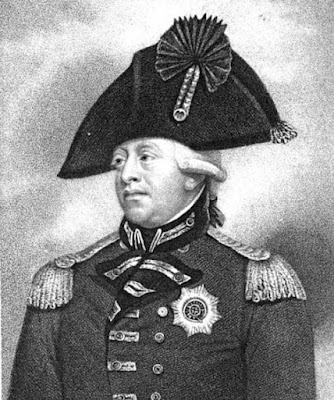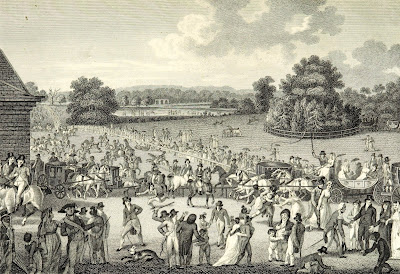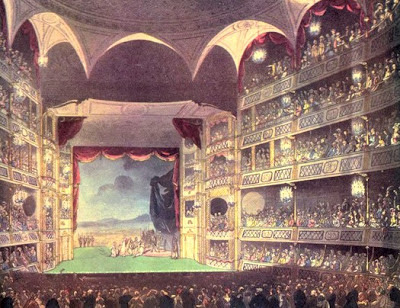 |
| George III from The Public & Domestic Life of his late, most gracious majesty E Holt (1820) |
On 15 May 1800, George III went to Hyde Park to review the 1st Foot Guards. During the review, a shot was fired which narrowly missed the King. Mr Ongley, a clerk in the Navy Office, who was standing only a few paces away, was struck, and it was said that “had the wound been two inches higher it must have been mortal.”1
 |
| Hyde Park on Sunday from Modern London by R Phillips (1804) |
Unperturbed, the King visited the Theatre Royal, Drury Lane, in the evening with the Queen and other members of the royal family.
Michael Kelly, the musical director of the theatre at the time recorded:
The culprit is securedWhen the arrival of the King was announced, the band, as usual, played 'God save the King'. I was standing at the stage-door, opposite the royal box, to see His Majesty. The moment he entered the box, a man in the pit, next the orchestra, on the right hand, stood up on the bench, and discharged a pistol at our august Monarch, as he came to the front of the box.
Never shall I forget His Majesty’s coolness - the whole audience was in an uproar. The King, on hearing the report of the pistol, retired a pace or two, stopped, and stood firmly for an instant; then came forward to the very front of the box, put his opera-glass to his eye, and looked round the house, without the smallest appearance of alarm or discomposure.1
The orchestral performers seized the perpetrator - an ex-soldier named James Hadfield who was later judged insane - and dragged him into the music room under the stage, where he was examined by the Duke of York; Richard Brinsley Sheridan, the theatre’s manager; and Sir William Addington, a Bow Street magistrate. The audience demanded that Hadfield should be brought on the stage, but Kelly succeeded in calming them with the assurance that he was in safe custody and that, if he were brought forward, he might have the chance to escape.
 |
| Theatre Royal, Drury Lane, from The Microcosm of London (1808-10) |
Despite the Lord Chamberlain urging him to retire, George III determined to remain and see the performance. There was some suggestion that the bullet was “only a squib” but after the narrow miss of the morning, it seems unlikely.2
Kelly wrote:
'God save the King' was then called for, and received with shouts of applause, waving of hats, &c. During the whole of the play, the Queen and Princesses were absorbed in tears; - it was a sight never to be forgotten by those present.1
The play was a comedy by Colley Cibber, She would, and she would not. Kelly wrote:
God save the KingNever was a piece so hurried over, for the performers were all in the greatest agitation and confusion.1
At the end of the play, the audience demanded 'God save the King' again. Kelly sung an extra verse that had been written “on the spur of the moment” by Mr Sheridan, which was met with “the most rapturous approbation.”1
The extra verse was as follows:
From every latent foe,Notes
From the assassin’s blow.
God save the King.
O’er him thine arm extend,
For Britain’s sake defend
Our father, prince, and friend,
God save the King.
(1) From Reminiscences of Michael Kelly (1826)
(2) From George III by Christopher Hibbert (1998)
Sources used include:
Hibbert, Christopher, George III (1998, Viking, Great Britain)
Kelly, Michael, Reminiscences of Michael Kelly of the King's Theatre and Theatre Royal Drury Lane (1826)

I feel cheated by the version of history I was taught at school! England seems to have been a much more vibrant, positively dangerously alive place. Was Hadfield really insane?
ReplyDeleteI tried to find a contemporary report of the trial but failed, so I am relying on other historians who say that he was tried for treason but acquitted on the grounds of insanity. Most of the people who attacked George III over the years seem to have been insane, or at least claimed to be!
DeleteI have discovered a post that Mike Rendell put up yesterday which has more information about Hadfield's trial: http://blog.mikerendell.com/?p=6072 - I hope you find it helpful.
DeleteAt trial for High Treason, Mr Hadfield was found insane based on the evidence of his own family and soldiers he had served with and his own behaviour at trial which was completely at odds with a malignant attempt to kill. Hadfield was an apprentice to the Aldergate silversmith SHougham and, while it was never posited at trial, the mercury vapors given off by silver gilding, would have had a disasterous effect on anyone breathing them. The Case is of note because the court ordered, for the first time, that the insane person be detained at His Majesty's Pleasure. Previously if found insane you were released. The Hadfield rules are now codifed and continue through until today.
DeleteThanks for this additional information. It is interesting to know that Hadfield's trial led to a new precedent being set.
DeleteThe Life of Mrs. Jordan is a contemporary account of someone in the theater. It has quite a few more details.
DeleteI have evidence that the Hadfield's arm was struck by a man seating next to him. This caused the bullet to pass over the King's head. This was reported in the Times next day. That man who probably saved the king's life was David Moses Dyte - my great great great grandfather. Richard Canin richardcanin@yahoo.co.uk
ReplyDeleteThat's very interesting!
DeleteThis was in the same year as the "Infernal Machine" assassination attempt on Napoleon on Christmas. Makes you wonder how much would change if both were assassinated.
ReplyDeleteAn interesting thought. No Napoleon. Would the war have ended more quickly? Probably. George IV as king in 1800. No Regency. Very different.
DeleteEm...I happened to come across a romance novel recently. Not really my genre, but it had an interesting setting, which seemed to be (I think) pre-1789, and the basis of which detailed an assassination attempt on the King just before the novel took place. Not sure if this was maybe your pen name? But the question I have: Was there an actual assassination around this time period?
ReplyDeleteNot one of mine! A Perfect Match is set in 1788-9 but it is written under by own name and is focused on the time of the king's illness.
DeleteHowever, there was a famous assassination attempt on George III in 1786 by a delusional woman named Margaret Nicholson who attempted to stab him with a dessert knife. Apparently she thought she was the rightful heir to the throne... You can read more on Wikipedia.